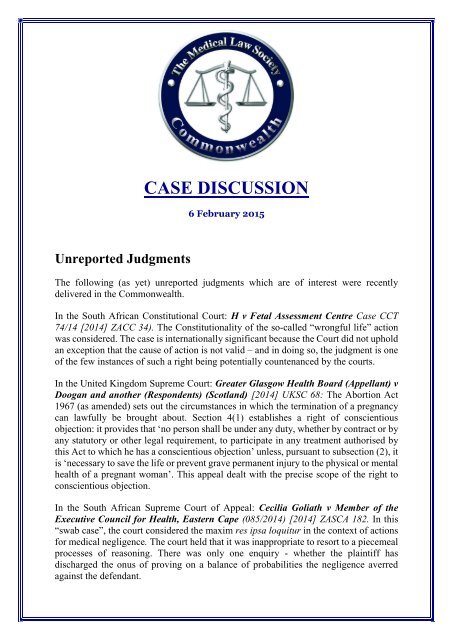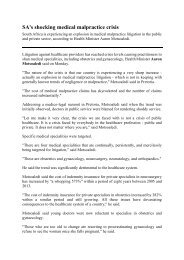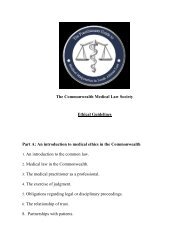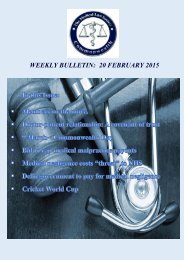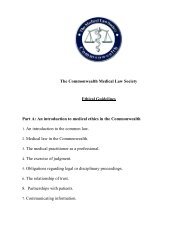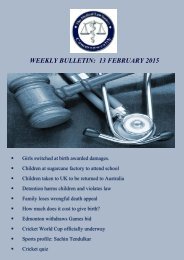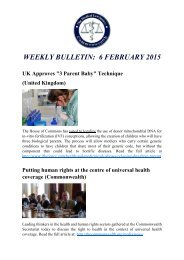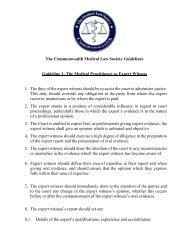CASE DISCUSSION
Create successful ePaper yourself
Turn your PDF publications into a flip-book with our unique Google optimized e-Paper software.
<strong>CASE</strong> <strong>DISCUSSION</strong><br />
6 February 2015<br />
Unreported Judgments<br />
The following (as yet) unreported judgments which are of interest were recently<br />
delivered in the Commonwealth.<br />
In the South African Constitutional Court: H v Fetal Assessment Centre Case CCT<br />
74/14 [2014] ZACC 34). The Constitutionality of the so-called “wrongful life” action<br />
was considered. The case is internationally significant because the Court did not uphold<br />
an exception that the cause of action is not valid – and in doing so, the judgment is one<br />
of the few instances of such a right being potentially countenanced by the courts.<br />
In the United Kingdom Supreme Court: Greater Glasgow Health Board (Appellant) v<br />
Doogan and another (Respondents) (Scotland) [2014] UKSC 68: The Abortion Act<br />
1967 (as amended) sets out the circumstances in which the termination of a pregnancy<br />
can lawfully be brought about. Section 4(1) establishes a right of conscientious<br />
objection: it provides that ‘no person shall be under any duty, whether by contract or by<br />
any statutory or other legal requirement, to participate in any treatment authorised by<br />
this Act to which he has a conscientious objection’ unless, pursuant to subsection (2), it<br />
is ‘necessary to save the life or prevent grave permanent injury to the physical or mental<br />
health of a pregnant woman’. This appeal dealt with the precise scope of the right to<br />
conscientious objection.<br />
In the South African Supreme Court of Appeal: Cecilia Goliath v Member of the<br />
Executive Council for Health, Eastern Cape (085/2014) [2014] ZASCA 182. In this<br />
“swab case”, the court considered the maxim res ipsa loquitur in the context of actions<br />
for medical negligence. The court held that it was inappropriate to resort to a piecemeal<br />
processes of reasoning. There was only one enquiry - whether the plaintiff has<br />
discharged the onus of proving on a balance of probabilities the negligence averred<br />
against the defendant.
Reported Judgments<br />
Birmingham Children's NHS Trust v B and another [2014] EWHC 531 (Fam);<br />
137 BMLR 222.<br />
A week-old baby with transposition of the great arteries required cardiac surgery – he<br />
had no prospects of long-term survival without surgery. The baby’s parents, who were<br />
Jehovah’s Witnesses, were willing to consent to surgery but not to necessary blood on<br />
religious grounds. The hospital sought a declaration from court that it would be lawful<br />
to perform cardiac surgery and to deploy blood during and consequent to that surgery.<br />
The parents did not actively oppose the hospital's application.<br />
In considering this application, the judge considered, in its widest possible sense, the<br />
baby's welfare best interests. It was clear on the evidence that, while risks attached to<br />
him undergoing the procedure, those were minimal risks, whereas if the baby did not<br />
undergo the procedure, his chances of survival were extremely poor. Looking at his<br />
welfare best interests, there was no doubt that it was in his best interests to undergo the<br />
surgery that was proposed. Because it was inevitable that he must receive blood<br />
transfusions during the course of, or subsequent to, the surgery the judge determined,<br />
notwithstanding the parents' understandable objections on religious grounds, that it was<br />
in the baby's welfare best interests to receive blood products both during the surgery<br />
and, if necessary, subsequent to it.<br />
Mental Health Trust and others v DD (by her litigation friend, the Official<br />
Solicitor) and another [2014] EWCOP 11; 140 BMLR 118.<br />
This case dealt with the determination of a person’s best interests who is mentally<br />
incapable of making legally valid decisions.<br />
A mother of five was pregnant with her sixth child. Four of the five children had been<br />
adopted, and the fifth was in care. The patient had a complex obstetric history, learning<br />
difficulties and autistic spectrum disorder, and was accordingly a vulnerable person.<br />
The hospital sought court orders concerning the health of mother during final stage of<br />
pregnancy, and the safe delivery of the unborn baby, as well as an order authorising<br />
assessment of mother's capacity to make decisions about contraception following the<br />
birth of baby. The issues were whether the patient had capacity to litigate on the relevant<br />
issues, whether the declarations sought were in the patient’s best interests, and whether<br />
the patient lacked capacity to consent to an assessment of her capacity to make decisions<br />
in relation to contraception. The applicants proposed that the patient should not be<br />
advised of the date planned for the caesarean procedure, but that they should be given<br />
partial information.
The Court held, on the facts, that the patient lacked the capacity to litigate in relation to<br />
the relevant issues. She lacked capacity to make decisions in respect of her healthcare,<br />
in particular to decide where to give birth to her unborn child and to decide whether to<br />
have her baby delivered by vaginal delivery or caesarean section. It was in her best<br />
interests, and therefore lawful for her to be taken to a hospital and for the medical,<br />
nursing and midwifery practitioners attending her to carry out a planned caesarean<br />
section and all necessary ancillary care; and to provide the patient with all necessary<br />
ancillary pre-operative care and treatment. The applicants were authorised to take such<br />
necessary, reasonable and proportionate measures to give effect to the best interests<br />
declaration, including forced entry into the patient’s home, restraint to prevent her from<br />
leaving the ward pending treatment and/or until it was clinically appropriate for her to<br />
be discharged, and any necessary sedation. The judge required the applicants to take all<br />
reasonable steps to minimise distress to the patient and to maintain her dignity, and<br />
concluded that there were reasonable grounds to believe that the patient lacked capacity<br />
to consent to an assessment of her capacity to make decisions in relation to<br />
contraception. However, it was not considered to be in the patient's best interests, or<br />
that she should be subject to a one-day assessment of her capacity to make decisions<br />
about contraception at this stage, and that application was refused. That issue would<br />
need to be addressed as a matter of urgency within two months or so after the birth.<br />
(Consideration was given to arts 6 and 8 of the European Convention for the Protection<br />
of Human Rights and Fundamental Freedoms 1950. Human rights – Mental Capacity<br />
Act 2005 – European Convention for the Protection of Human Rights and Fundamental<br />
Freedoms 1950, arts 5 and 8).<br />
R v H 140 BMLR 59; [2014] EWCA Crim 1555.<br />
This is a case dealing with the use of expert evidence, and the undesirability of leading<br />
unreliable or inappropriate expert evidence. The case follows a trend in a number of<br />
jurisdictions in which expert evidence has come under increasing scrutiny by the courts<br />
(see eg. United Kingdom: Jones v Kaney - 119 BMLR 167 [2011] UKSC 13; Ndlovu v<br />
Road Accident Fund 2014 (1) SA 415 (GSJ)).<br />
The applicant was a general practitioner who had been convicted of various offences.<br />
The trial judge had refused to admit evidence of an expert which was in the appellant’s<br />
favour, and the applicant appealed. The appeal against conviction was dismissed. The<br />
court found that the trial judge had not erred in refusing to admit the evidence of the<br />
expert. The defence was entitled in appropriate cases to call expert evidence on a<br />
specific subject outside the knowledge and experience of the jury which might assist<br />
them in the task of assessing credibility and reliability. However, in the instant case, the<br />
trial judge had found that there was no evidence on which the jury could find that the<br />
complainant had 'recovered' or 'retrieved' memories during the treatment for her mental<br />
illness, and there was thus no basis for admitting the expert’s evidence of false memory<br />
syndrome, which would have had the effect of usurping the function of the jury in<br />
assessing the complainant's credibility as a witness.
(Editor’s note: Of importance, the court (per curiam) expressed a real concern about<br />
the use of unreliable or inappropriate expert evidence in such cases. In the United<br />
Kingdom, the Criminal Procedure Rules 2014 and amendments to the Criminal Practice<br />
Directions made by the Lord Chief Justice came into force which incorporated certain<br />
reliability factors recommended by the Law Commission for the admission of expert<br />
evidence. When these changes occurred, a new and more rigorous approach on the part<br />
of the courts to the handling of expert witnesses was adopted. The intention was to avoid<br />
misunderstandings about what was (and what was not) appropriately included in an<br />
expert's report and so either avoid, or at least render far more straightforward,<br />
submissions on admissibility such as those made in the instant case. In particular,<br />
comment based only on analysis of the evidence which effectively usurped the task of<br />
the jury was to be avoided. Part 33 of the Rules now includes an identification of the<br />
expert’s duty to the court as being: to help the court to achieve the overriding objective<br />
that criminal cases be dealt with justly by giving opinion which is objective and<br />
unbiased and within the expert’s area or areas of expertise. This duty overrides any<br />
obligation to the person from whom the expert receives instructions or by whom the<br />
expert is paid. The duty includes obligations to define the expert’s area or areas of<br />
expertise in the expert’s report, and when giving evidence in person. When giving<br />
evidence in person, the expert is obliged to draw the court’s attention to any question to<br />
which the answer would be outside the expert’s area or areas of expertise; and to inform<br />
all parties and the court if the expert’s opinion changes from that contained in a report<br />
served as evidence or given in a statement).


